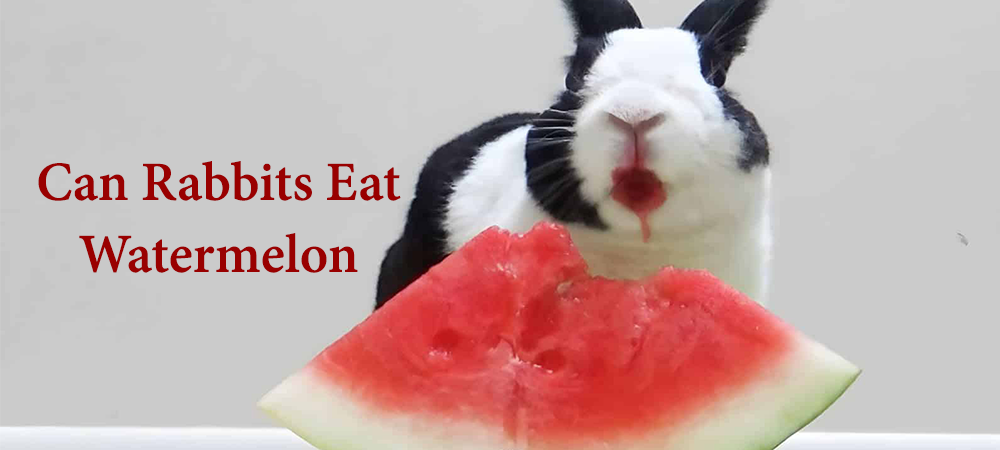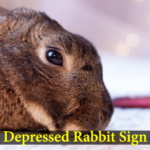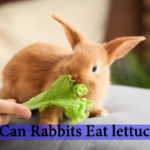Many pet owners ask, can rabbits eat watermelon or can bunnies have watermelon because it’s a refreshing, juicy fruit. Watermelon can be a safe occasional treat for rabbits when served properly. Understanding how much watermelon a rabbit can eat helps prevent digestive upset and keeps their diet balanced.
Not only can rabbits have watermelon, but many enjoy the sweet taste. However, portion control is essential. Too much sugar from fruit can harm your bunny’s health. This guide explains how rabbits can eat watermelon safely, how often to feed it, and tips for introducing melon to their diet.
Owners also wonder if rabbits can eat watermelon rind or skin and whether other types of melon are suitable. Knowing which parts are safe and how to serve them ensures your bunny enjoys a tasty snack without risk. With the right approach, watermelon can be a healthy, hydrating treat for bunnies. Head back to the Home Page for more rabbit feeding guides and tips.
Can rabbits eat watermelons?
So, today’s inquiry is:- Can rabbits eat watermelons? The answer to this query is a big YES! This fruit happens to be one of the healthiest that you can give to your bunnies. It is likely that rabbits will eat the melons with full mouthfuls.
It’s important to remove the skin so that you do not expose them to any pesticides or other possible issues.
Also, rabbits love watermelon’s taste. Therefore, if you have a way, pluck all the seeds away and soak them for one night so as they soften for bunnies’ eating.
Many people has also asked are bunnies allowed watermelon?
So, keeping bunnies in our mind, we are trying to answer all the questions related to rabbit’s diet which include watermelon.
Watermelon is a good selection that provides nutritional value to your rabbits when coupled with a variety of fruits and vegetables.
It will definitely boost rabbits’ immunity and health, which can be clearly seen in their activities.
We provide detailed information on the nutritional facts and health benefits of watermelon, as well as the absolute mistakes that you should avoid when feeding watermelons to your rabbits.
By the end of this article, I hope you will be well-informed enough to decide whether watermelons are the best choice or not for your little craters.
You can also read about - Can Rabbits eat Bananas?
Nutritional benefits of watermelons for rabbits
Just like human beings, rabbits can benefit from the nutrients in watermelon. In this section, I have outlined some of the nutritional components that make up a watermelon as well as how it benefits rabbits:
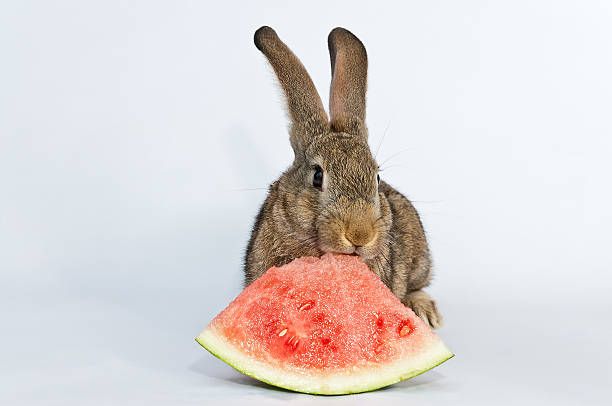
Although it’s mostly water, watermelon offers some nutritional benefits for rabbits when given sparingly. The fruit is about 90% water, so rabbits can have watermelon as a hydrating treat, especially on warm days.
It also contains vitamin A, vitamin C, and small amounts of potassium, which support immune health and proper body functions. While bunnies can eat watermelon for these nutrients, remember that the sugar content is still high compared to leafy greens.
Because of its fiber content—especially in the rind—rabbits can benefit from a little watermelon as an occasional snack to add variety and hydration to their diet. Always balance fruit treats with plenty of hay and fresh greens for optimal health.
| Nutrient | Amount per 100 g | Benefit for Rabbits |
|---|---|---|
| Water | 91 g | Hydration and cooling treat |
| Calories | 30 kcal | Low calorie snack |
| Sugar | 6 g | Sweet taste, limit for health |
| Fiber | 0.4 g | Aids digestion (esp. rind) |
| Vitamin A | 569 IU | Supports vision and immunity |
| Vitamin C | 8.1 mg | Boosts immune health |
| Potassium | 112 mg | Supports muscle and nerve function |
Dangers of watermelons for rabbits
Fruits should generally be additional supplements and not the main diet of pets, especially when we are talking about rabbits.
There is a high sugar level in watermelons which can be fatal to them.
They are moderately low in nutrition and very high in sugar hence making them occasionally treat foods that should only be served after long intervals.
Since bunnies adore sweet juicy taste of melons they are not especially nutrient-rich meals. So give them melon fruit once or twice a week
If watermelon is fed improperly, there can be numerous adverse health consequences.
As stated above, watermelon has a high sugar content, and intake of too much sweetness can affect rabbits’ digestive tracts, which can give them a painful experience. It also causes gastric problems, which are generally termed tympanism.
The juicy and tantalizing essence of watermelon leads to significant dietary imbalances in rabbits.
The seeds can cause blockages in the intestines. Rabbits start vomiting and bloating if they choke on watermelon seeds in excess.
Due to its high sugar content, obesity can be a serious cause of concern. However, obesity is very common and is caused by too much food and lack of exercise. The rabbits might become lazy and inactive.
Also Check - Can Bunny Eat Spinach? How much spinach is safe for rabbit to eat.
How much watermelon is safe to feed your rabbit?
An ideal rabbit’s diet consists of fresh, clean drinking water, the finest quality hay and grass, and some veggies and fruits. Fresh fruits and vegetables should make up 15–30% of the diet.
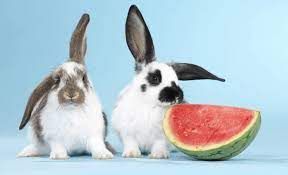
When it comes to fruit, many owners ask how much watermelon is safe to feed your rabbit. Rabbits can eat watermelon, but only as a treat. Because it’s high in natural sugar, can bunnies eat watermelon daily? No — it should be limited to small, occasional servings.
A good guideline is to offer about 1–2 small cubes of watermelon per 2 lbs (1 kg) of body weight, once or twice a week. This way, your rabbit can eat watermelon safely without upsetting their digestive system. Make sure the fruit is fresh, seedless, and cut into bite-sized pieces for easy chewing.
Some owners also ask can rabbits eat watermelon rind or skin. Rabbits can nibble small amounts of the rind as long as it’s washed thoroughly, but the flesh should remain the main part of the treat. By following these tips, bunnies can have watermelon as a refreshing snack while maintaining a balanced diet.
So, the question is, how much watermelon should I feed my rabbit?
One to two servings a week of fresh watermelon are sufficient for rabbits. Cut the watermelon into smaller pieces to offer the rabbits so they can easily eat it without too much mess or difficulty.
Due to the watery composition of watermelons, you can feed slightly larger amounts to your bunnies than you can with other delicious sweet treats.
A quick guide to how much watermelon you can offer your rabbits:
| Age | Quantity |
| Baby rabbits or bunnies | Few 1-inch cubes |
| Juvenile rabbits (15–20 days old) | Few 1-inch cubes |
| Adult rabbits | ½ a cup |
Types of Watermelon to feed your rabbits
Prefer watermelons with fewer seeds and organic feed for your rabbit. The safety of rabbits is ensured if you buy seedless and organic watermelons. There should be no pesticides or waxes on the rind, and having no seeds will prevent gastrointestinal issues.
The ideal size of watermelon can be found in shops during the summer season; ‘personal size’ watermelon is one that everyone fonds of. Chop these into thin slices, and you can share them right next to your rabbits. The smaller the piece size, the easier it will be for your rabbits to grab it, and the smaller the mess will be!
Is watermelon rinds good for rabbits?
Many bunny owners wonder, can rabbits eat watermelon rind or can rabbits eat watermelon skin. The answer is that watermelon rind can be safe for rabbits in small amounts, as long as it is clean, fresh, and free from pesticides.
While the sweet red flesh is what most rabbits enjoy, the rind actually contains fiber that can benefit digestion. However, it should only be offered in moderation, since too much can cause stomach upset. Rabbits can eat watermelon rind occasionally, but it should not replace hay or leafy greens in their daily diet.
If you want your rabbit to eat watermelon rind safely, always wash it thoroughly, remove any hard outer skin, and cut it into small pieces. This ensures that bunnies can have watermelon rind as a crunchy, low-sugar snack without risk.
Can rabbits eat watermelon seeds?
Watermelon seeds are somewhat toxic and are not suitable for rabbits to eat. The seeds are not suitable for rabbits because they cause difficulties in digestion and can cause intestinal blockage.
Therefore, if we’re offering watermelons with black or brown seeds, also called diploid watermelons, it’s necessary and critical to remove all the seeds from the pieces to save them from any health hazards.
So, if you are also thinking can bunnies eat watermelon seeds in small quantity then the answer is No. We should not give watermelon with seeds to bunnies as it will be harmful for them.
Can rabbits eat watermelon scraps?
Yes, watermelon scraps can be consumed safely by rabbits. The reason is that watermelon scraps are not toxic for them. Adult rabbits can eat the scraps in small quantities, and surely they will enjoy the sweet and refreshing taste of watermelon.
However, for baby rabbits, there are certain conditions: watermelon can be fed to them in a relatively smaller quantity, and scraps are not suitable for them because they have delicate digestion.
So, it will be better to feed them watermelons occasionally, and only the flesh part.
Tips for feeding your rabbits watermelon
Everything is in moderate quantity.
Clean and fresh watermelons only.
Seedless watermelons are always good.
Always beware, just in case.
Final words
While rabbits may not eat everything, they love the wide variety of fruits, vegetables, and other treats. In moderation, watermelon can be a fine treat to feed your rabbits.
Watermelon has lots of health benefits and can also combat dehydration in the summer. Watermelon definitely makes the cut when it comes to feed that is safe and tasty for goats.
All in all, watermelon is a pretty healthy treat for your rabbits, in moderation.
